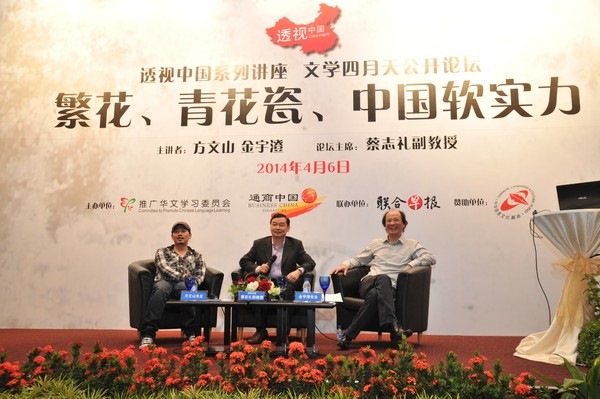“Blossoms, Porcelain and China’s Soft Power”
Business China and the Committee to Promote Chinese Language Learning jointly presented the “China Insights Series and Literature in April Public Lecture” at the SPH Media Centre on 6 April 2014. Distinguished speakers for the lecture were Vincent Fang, legendary Chinese pop music lyricist and Jin Yucheng, Editor of prominent literature magazine and award-winning author of a novel entitled “Blossoms”. Guest-of-Honour was Business China Board of Director and Senior Minister of State for Finance & Transport Mrs Josephine Teo.
Speaking to about 700 Business China members and Lianhe Zaobao readers, the two speakers shared views on the cultural prowess of including traditional Chinese literary symbols in popular works.
Mr Vincent Fang started off the session by sharing with the audience his love for Chinese language and literature since young. This interest led him to eventually use many of the traditional Chinese literary symbols, e.g. the blue porcelain, in lyrics for Chinese pop songs. He encouraged budding writers not to confine their reads to just their interests but to read widely. “Reading provides the best return of investment,” said Mr Fang, “Writers spent years researching content and gaining life experiences before penning them into books. By spending just a few hours or a few days on a book, we can gain all their wisdom and knowledge.”
As a lyricist, Mr Vincent Fang also spoke about the difference between a poet and a lyricist. To him, a poet writes to express personal feelings whilst a lyricist writes for the public, such that the public is able to identify with the emotions carried in songs. Poems are also standalone creative works but some lyrics on their own may not have much meaning or creative value. However, because of their mass appeal, lyrics are excellent tools for bringing lofty art and ideas closer to the public, and are good messengers of soft power.
Extrapolating on the same note, Mr Jin Yucheng also spoke at length about writing for the mass public. As a native Shanghainese, Mr Jin grew up speaking local Shanghainese dialect. However to accommodate the large influx of foreigners into Shanghai, Putonghua or standard Mandarin became the default. As less and less people knew Shanghainese, Mr Jin faced a predicament while writing the book “Blossoms” because he has to decide the percentage of Shanghainese in the book. In order for more people to appreciate his book, he decided on more standardised language usage, thereby sacrificing some of the rich local flavour. As a result of this, however, more non-Shanghainese readers are able to appreciate the unique culture abounded in “Blossoms”.
Both authors agreed that language plays an instrumental role in enhancing awareness of one’s culture and increasing influence through soft power. With increasing mass appeal and making culture more accessible to the public, popular lyricists and writers should accede to their responsibility in preserving and transmitting traditional aesthetic values, in the face of increased globalisation and invasion of imported cultures.
Rounding off with a short reflection speech was Mrs Josephine Teo, when she shared her key takeaway of the customer-oriented nature of a lyricist and writer. Just like doing business, it was important to research on the needs and wants of the audience. In conclusion, Mrs Teo urged Singaporeans to develop their own channel of affinity with the Chinese language, whether it is through songs, novels or other cultural forms. This is so that they can maintain their linkage with the Chinese-speaking world, thereby further honing their bilingual and bicultural capabilities.

